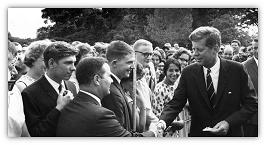The Peace God Gives
The Peace God Gives
People everywhere long for peace. In families, in local communities, within a nation, throughout the world. Peaceful coexistence, to borrow a phrase used in international relations a few decades ago, is the earnest desire of most people.
Nowadays we have the Peace Movement – although some of its activities are far from peaceful. Peace protests, peace marches, and peace vigils are some of the methods employed by these groups. Most of their activities appear to be politically motivated.
 In the 1960s the Peace Corps, brainchild of John F. Kennedy, stole the imagination of many young Americans. A young woman, unhappy and dissatisfied with life, responded to the advertisement to join the Peace Corps, hoping it would bring peace and satisfaction into her life. She was sent to Irian Jaya, but soon realised the world wouldn't supply what she was looking for. Through her work, however, she came into contact with an old Indian. He was different from anyone she had ever met. He told her that the source of his peace and contentment was having Jesus in his heart. So she started reading the Bible. By the witness of that elderly Indian and through the Word of God she found the peace that only Christ can give. Later that young Peace Corps volunteer went to Brazil as a missionary.
In the 1960s the Peace Corps, brainchild of John F. Kennedy, stole the imagination of many young Americans. A young woman, unhappy and dissatisfied with life, responded to the advertisement to join the Peace Corps, hoping it would bring peace and satisfaction into her life. She was sent to Irian Jaya, but soon realised the world wouldn't supply what she was looking for. Through her work, however, she came into contact with an old Indian. He was different from anyone she had ever met. He told her that the source of his peace and contentment was having Jesus in his heart. So she started reading the Bible. By the witness of that elderly Indian and through the Word of God she found the peace that only Christ can give. Later that young Peace Corps volunteer went to Brazil as a missionary.
Peace does not come through protesting or marching, by holding a vigil or joining a corps. It comes through Jesus Christ. It comes from Him. Paul wrote, "…we have peace with God through our Lord Jesus Christ," (Rom. 5:1). And to the Philippians he declared, "And the peace of God, which passeth all understanding, shall keep your hearts and minds through Christ Jesus" (Phil. 4:7). Yes, Jesus gives peace – "Peace I leave with you. My peace I give to you" (John 14:27).
Reference to Young's Concordance emphasizes the importance of this topic with biblical writers. Mostly in the Old Testament the word is "shalom", meaning peace or completeness. In the New Testament the word used for peace conveys the thought of unity and concord.
The people of God were promised peace. David knew it. "The Lord will bless his people with peace." David was inspired to write this after describing the awesome and subsequent devastation of a storm. (See Psalm 29:3-9)
"The Lord is King forever. The Lord will give strength." But at the beginning of this Psalm, David sets down the obligations of the people. In v. 2 he says, "Give to the Lord the glory due to his name; worship the Lord in the beauty of holiness." Yes, give to the Lord the glory due to Him. That's much more than giving a token contribution. And worship Him "in the beauty of holiness". The Berkeley translation at this verse has this footnote: "Consider God's nature – His wisdom, power, holiness, fairness, mercy into infinity; it helps us to adore Him and to feel our dependence on Him", "Great peace have they which love my law" (Psalm 119:165). And perhaps the most wonderful promise on this theme in the whole of the Old Testament is found in Isaiah: "Thou wilt keep him in perfect peace, whose mind is stayed on thee; because he trusteth in thee" (Is. 26:3).
Now, of course, the New Testament takes this much further. In thirteen Pauline epistles the apostle greets the recipients of each letter and every time comes the reminder that "peace" is from God our Father and the Lord Jesus Christ (Rom. 1:7, 1 Cor. 1:3, 2 Cor. 1:2, Gal. 1:2, Eph. 1:2, Phil. 1:2, Col. 1:2, 1 Thess. 1:1, 2 Thess. 1:2, 1 Tim. 1:2, 2 Tim. 1:2, Titus 1:4, Philemon v. 3).
Already we have noted that Jesus, just before His betrayal bequeathed "the legacy of peace" to His disciples. As He faced the death of the Cross, Jesus comforted His followers in this way. Thus the legacy of peace is linked to Christ's death at Calvary. Paul gives us the endorsement for this. In Colossians 1:2, Paul declares the Lord Jesus Christ to have "made peace through the blood of his cross". This is where real peace, genuine peace, is to be found.
There can be no true peace apart from the Cross of Christ for it is a Cross of reconciliation. This is the very point Paul makes as we read on in v. 20 … "by him to reconcile all things to himself". Mankind must realize the need to submit beneath the Cross of Jesus and be reconciled to Him before they can be reconciled to each other. Only then will men be able to live in peace.
 The "world" talks of peace, but it is the Lord Jesus Christ alone who can give peace. The "world" protests that the arms race, nuclear weapons, and so on, are an obstacle to peace. The "world" marches in support of peace. The "world" engages in doing good in an effort to create peace. Some cry out peace when there's none. Jeremiah told this to the Israelites long ago. Be warned he told them. They will say "Peace, peace; when there is no peace" (Jer. 6:14; 8:11). Today's soothsayers are not different.
The "world" talks of peace, but it is the Lord Jesus Christ alone who can give peace. The "world" protests that the arms race, nuclear weapons, and so on, are an obstacle to peace. The "world" marches in support of peace. The "world" engages in doing good in an effort to create peace. Some cry out peace when there's none. Jeremiah told this to the Israelites long ago. Be warned he told them. They will say "Peace, peace; when there is no peace" (Jer. 6:14; 8:11). Today's soothsayers are not different.
Worldly thinking would have us believe "peace" is something men can organize themselves. But that is not the peace Jesus gives. He says, "Peace I leave with you. Peace I give unto you."
In fact, Jesus said to His disciples that the world would only give them tribulation. John 16:33 tells us that Jesus spoke to them as He did in chapters 14, 15 and 16 to assure them, "In Me you might have peace. In the world you shall have tribulation; but be of good cheer, I have overcome the world". And it is an uncompromising faith in the Lord Jesus Christ that gives us confidence for the future. "And this is the victory that overcometh the world, even our faith" (1 John 5:4).
Even in this troubled world it is possible to find peace – absolute and perfect peace comes to all who by faith receive and acknowledge Jesus Christ as Saviour and Lord.
The message of the Bible is well summed up in this succinct, yet profound statement:
NO GOD – NO PEACE … KNOW GOD – KNOW PEACE!

Add new comment